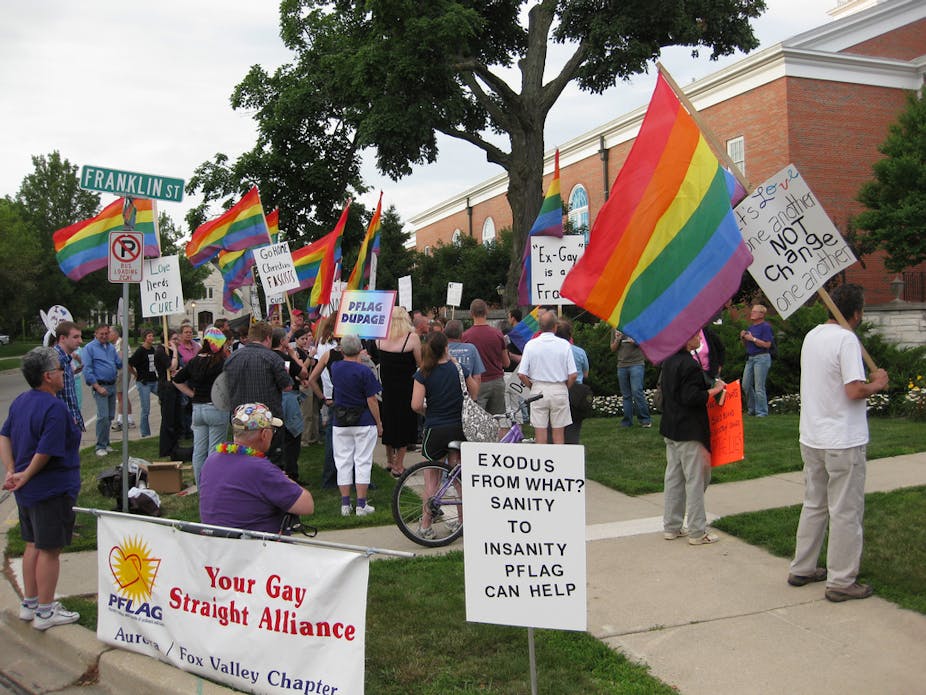Alan Chambers, president of the world’s largest “ex-gay” organisation, Exodus International, recently renounced the group’s long-held position that homosexuality can be “cured” – that gay people can become straight.
Since 1976, Exodus has been working with people who experience a conflict between their faith and their sexuality. It has over 260 groups ministering around the world, including in Australia.
Last month, the Californian government passed a bill outlawing reparative therapy for people under the age of 18. In response, Exodus released a statement saying, “we do not subscribe to therapies that make changing sexual orientation a main focus or goal.”
Addressing the most recent Exodus annual conference, Chambers reiterated this position. In a speech that blended camp humour and biblical references, he said that there was no quick fix for people struggling with unwanted homosexual desire. There was no “magic wand” that could be waved, so gays could “go be straight and mate”.
Chambers, who identifies as “ex-gay” and is married with two children, admitted that he still has same-sex desires. He argued that Exodus’ primary mission should be to help Christians manage their homosexual desires. They should no longer encourage clients to expect their homosexual desires to disappear, or to experience heterosexual desires.
“Change isn’t the absence of struggle,” he said, “it’s the freedom in the midst of that struggle to make a different decision.”
This shift away from conversion therapy brings Exodus into line with established medical and psychiatric opinion. The American Psychiatric Association removed homosexuality from its Diagnostic and Statistics Manual (DSM) for mental illness in 1973. The World Health Organisation (WHO) followed in 1990, removing homosexuality from its International Classification of Diseases (ICD-10).
In May of this year, the Pan American Health Organization released a statement saying that so-called “reparative” or “conversion” therapies “represent a serious threat to the health and well-being of affected people.”
No peer-reviewed study has demonstrated that complete change in sexual orientation is possible. In 2003 Dr Robert Spitzer published an un-refereed paper widely cited by conversion groups as proof that change was possible. The study merely demonstrated that people with strong ideological (that is religious) motivations could achieve a reduction in homosexual desire.
Ironically, Spitzer had been instrumental in the removal of homosexuality from the DSM in 1973. The 2003 paper has since been shown to be methodologically flawed. Spitzer retracted it earlier this year.
Leading Australian campaigner against conversion therapy, Anthony Venn-Brown reports that at least ten organisations, including Exodus, currently offer reparative or conversion therapies in Australia. All of these groups are grounded in conservative Christian ideological opposition to homosexuality. They offer a combination of psychological and spiritual therapies to clients from predominantly religious backgrounds.
Conversion therapy plays a much wider role in Australian sexual politics than simply (mis)treating gay and lesbian Christians. This religiously inspired, pseudo-psychological discourse forms one of the only institutional bulwarks to homophobia in Australian culture.
In their literature, conversion groups resist calling people “lesbian” or “gay”. Rather, they refer to people suffering with “same-sex attraction”, “unwanted homosexual desires”, and “the homosexual lifestyle”. This language associates homosexuality solely with sex and sexual desire.
They dissociate homosexuality from love, family and all other aspects of humanity and human relationships. Unsurprisingly, this same language informs all the “family values” organisations currently mobilised in Australia against same-sex marriage and same-sex parenting.
Exodus’ recent admission that so-called “ex-gays” never lose their homosexual desires amounts to an acknowledgement that reparative and conversion therapy doesn’t work. The world’s largest “ex-gay” organisation has all but stated that gay people cannot become straight. This admission is monumental. It has the potential to radically undermine one of the major tenets of religious homophobia: that sexuality is a choice.

